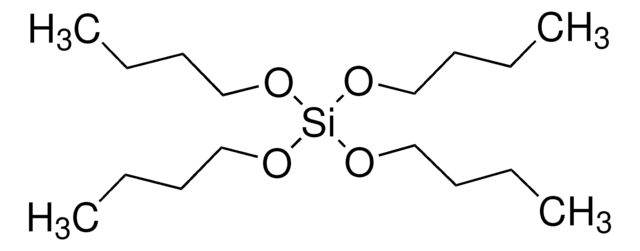218472
Tetramethyl orthosilicate
98%
Synonyme(s) :
Tetramethoxysilane
About This Item
Produits recommandés
Densité de vapeur
5.25 (vs air)
Niveau de qualité
Pression de vapeur
13 hPa ( 20 °C)
Pureté
98%
Forme
liquid
Indice de réfraction
n20/D 1.368 (lit.)
Point d'ébullition
121-122 °C (lit.)
Pf
−4 °C (lit.)
Densité
1.023 g/mL at 25 °C (lit.)
Chaîne SMILES
CO[Si](OC)(OC)OC
InChI
1S/C4H12O4Si/c1-5-9(6-2,7-3)8-4/h1-4H3
Clé InChI
LFQCEHFDDXELDD-UHFFFAOYSA-N
Vous recherchez des produits similaires ? Visite Guide de comparaison des produits
Application
Mention d'avertissement
Danger
Mentions de danger
Classification des risques
Acute Tox. 1 Inhalation - Eye Dam. 1 - Flam. Liq. 3 - Skin Irrit. 2
Code de la classe de stockage
3 - Flammable liquids
Classe de danger pour l'eau (WGK)
WGK 1
Point d'éclair (°F)
78.8 °F - closed cup
Point d'éclair (°C)
26 °C - closed cup
Équipement de protection individuelle
Eyeshields, Faceshields, Gloves, type ABEK (EN14387) respirator filter
Certificats d'analyse (COA)
Recherchez un Certificats d'analyse (COA) en saisissant le numéro de lot du produit. Les numéros de lot figurent sur l'étiquette du produit après les mots "Lot" ou "Batch".
Déjà en possession de ce produit ?
Retrouvez la documentation relative aux produits que vous avez récemment achetés dans la Bibliothèque de documents.
Les clients ont également consulté
Articles
Silica's versatility spans various industries, including biomedical applications.
Synthesis of Melting Gels Using Mono-Substituted and Di-Substituted Alkoxysiloxanes
The properties of many devices are limited by the intrinsic properties of the materials that compose them.
Notre équipe de scientifiques dispose d'une expérience dans tous les secteurs de la recherche, notamment en sciences de la vie, science des matériaux, synthèse chimique, chromatographie, analyse et dans de nombreux autres domaines..
Contacter notre Service technique












